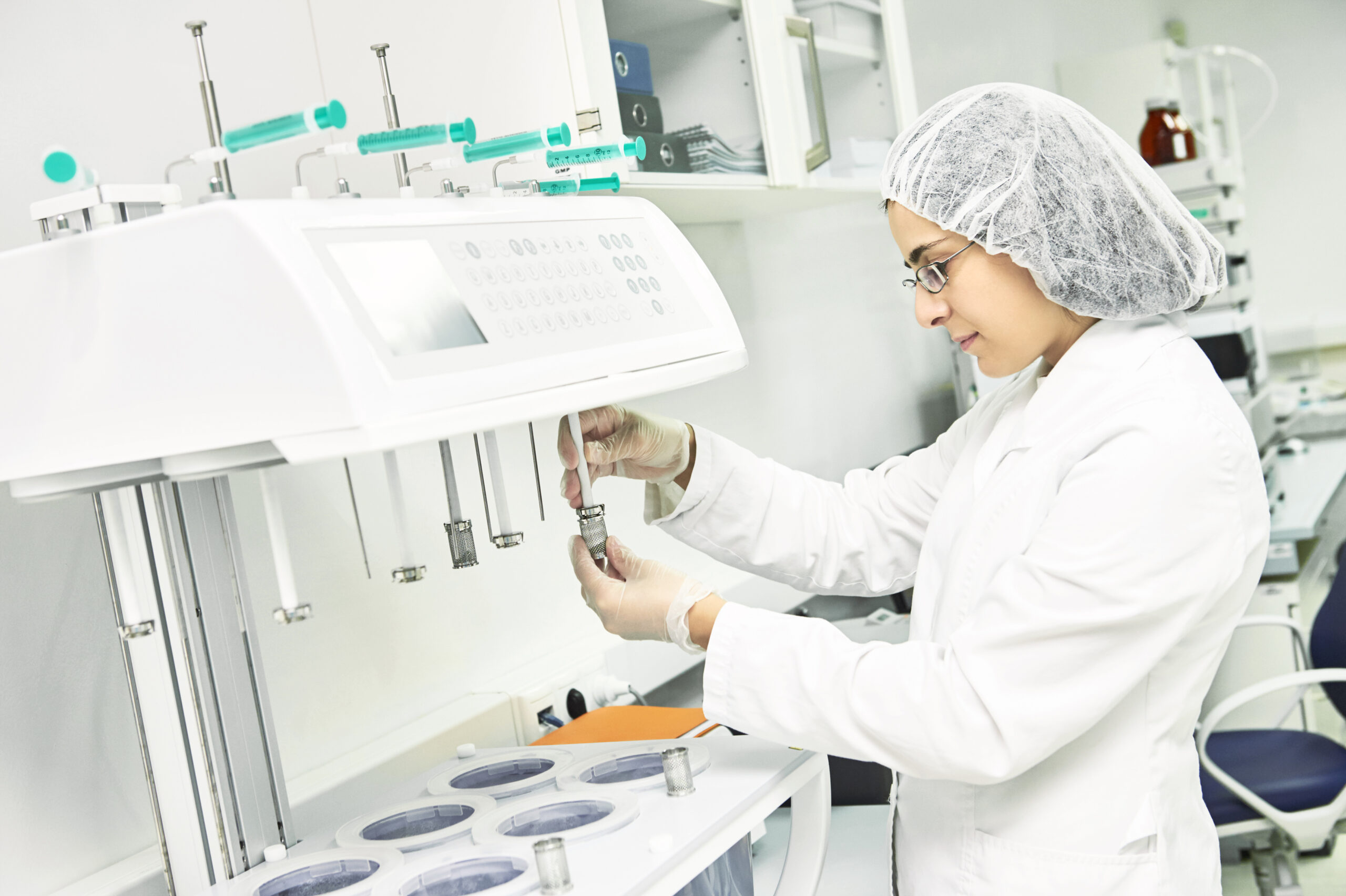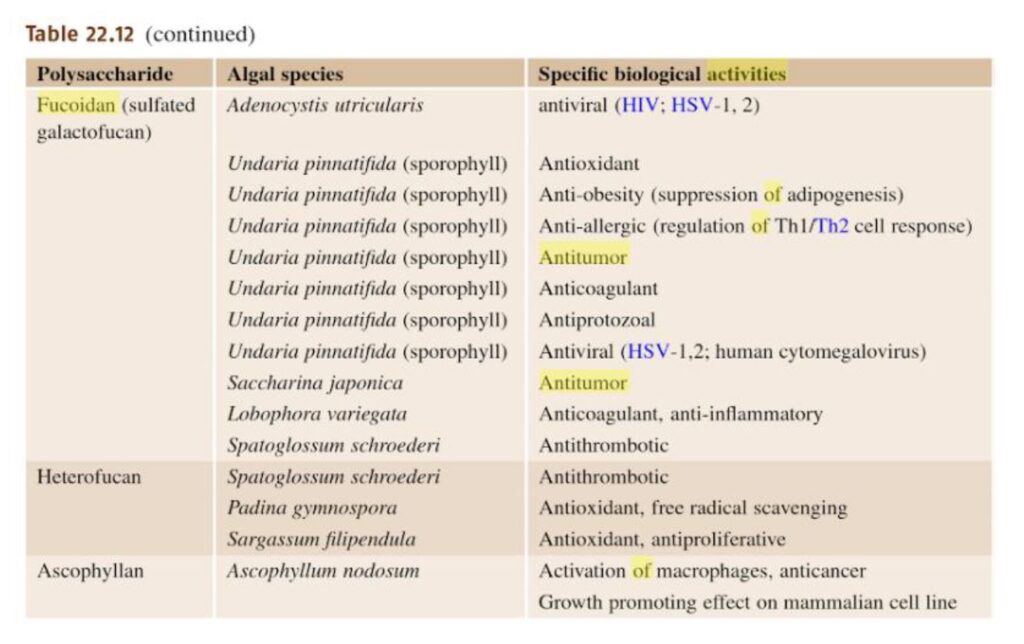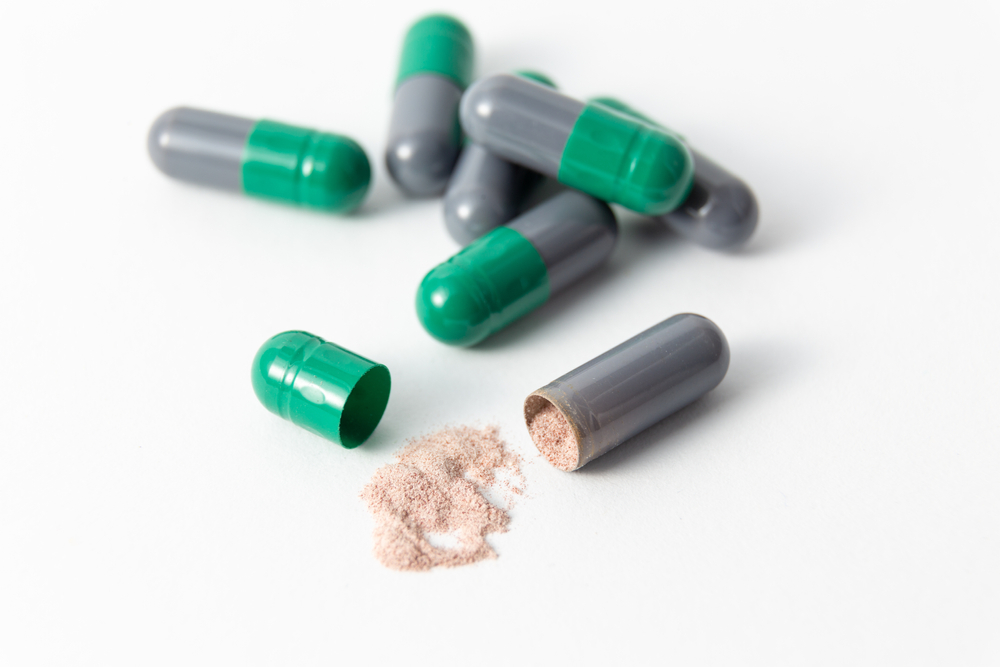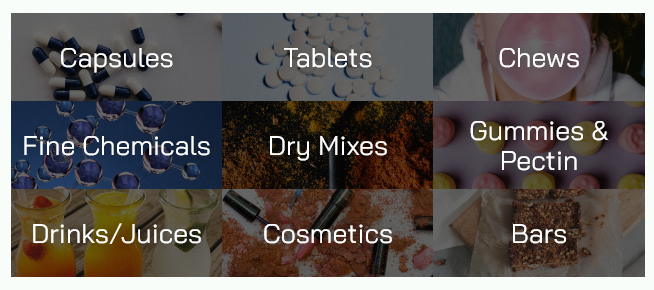
Welcome to UltraFucoidan™
Natural Immune Support from the Ocean
The Nature’s Potency in Every Granule.
Elevate Your Creations with Pure Wellness.
Not Just a Product – It’s an Ingredient Revolution!
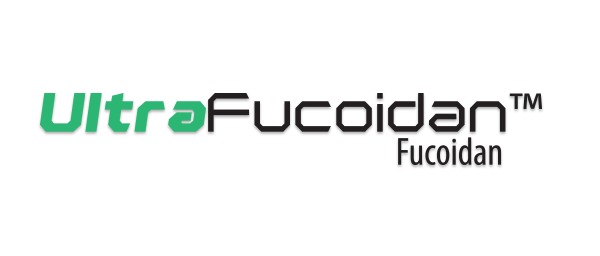
The Nature’s Potency in Every Granule.
Elevate Your Creations with Pure Wellness.
Not Just a Product – It’s an Ingredient Revolution!
Media Center
Find out where Vesta® Nutra will be.
Access news and the latest posts regarding UltraFucoidan™.
Check out the latest research and resources for UltraFucoidan™.

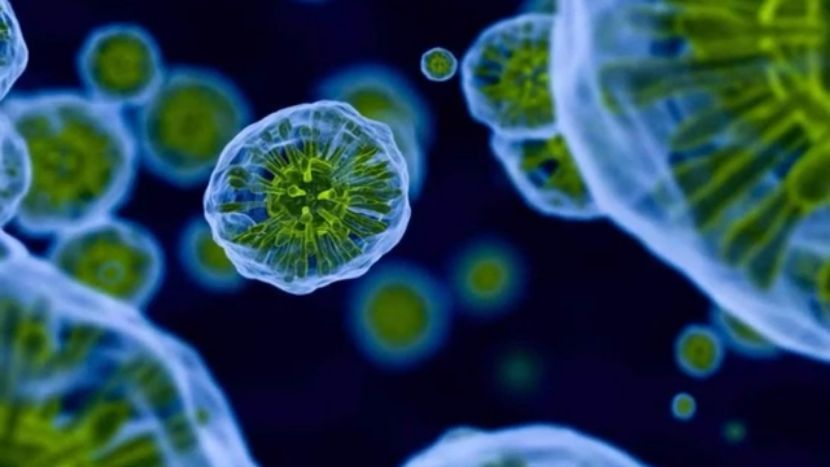
Why Do We Need Fucoidan?
Why UltraFucoidan™
UltraFucoidan™ is a highly bioactive compound isolated from the Laminaria and Undaria species grown in Korean ocean waters. Our proprietary manufacturing technologies allow us to maximize the sulfate content, at over 25% with maximum bioactivity, to optimize therapeutic properties. This process is:
In addition, the fucoidan extracts are combined with rich polyphenol antioxidants for additional immunity support. The applications are endless for pharmaceutical, nutritional, dermatological, and medical device applications.
What is Fucoidan?
Download UltraFucoidan™ Brochure

Research & Development
Vesta Nutra has conducted extensive research on fucoidan, a compound found in seaweed known for its numerous health benefits. Fucoidan is rich in antioxidants, which help protect the body from damage caused by free radicals. This compound supports immunity and has shown promising potential in cancer treatment, exhibiting strong anti-cancer properties.
In addition to our own research, there are multiple global leading research institutions that are conducting human clinical trials. The research aims to further understand and validate the health benefits of fucoidan.
Research on Health Benefits of UltraFucoidan™
Product Details
- Appearance: Fine Powder
- Odor / Taste: Characteristic
- Activity: 85%
- Package Unit: 1-5 kg
- Store in a cool, dry place
- Do not freeze
- Keep away from direct sunlight
- Packaging: Aluminum Foil Bags, 1-5 kg
- Capsules
- Tablet
- Chews
- Fine Chemicals
- Gummies & Pectin
- Dry Mixes
- Drinks/Juices
- Bars
- Cosmetics
Abundance
Abundance
Ultrafiltration
Ultrafiltration
Safety
Safety
Bioactivity
Uses & Applications
References
A study of fucoidan from the brown seaweed Chorda filum
Alexander O. Chizhov a,b, Anne Dell a, Howard R. Morris a, Stuart M. Haslam a,
Roy A. McDowell a, Alexander S. Shashkov b, Nikolay E.
Fucoidan as a Potential Therapeutic for Major Blinding Diseases—A Hypothesis
Alexa Klettner
Department of Ophthalmology, University Medical Center, University of Kiel, 24105 Kiel, Germany;
aklettner@auge.uni-kiel.de; Tel.: +0049-431-597-2401; Fax: +0049-431-597-3140
Fucoidan: Structure and Bioactivity
Bo Li*, Fei Lu, Xinjun Wei and Ruixiang Zhao
School of Food Science, Henan Institute of Science and Technology, Xinxiang 453003, Henan, P.R.
China.
Therapies from Fucoidan: An Update
Janet Helen Fitton *, Damien N. Stringer and Samuel S. Karpiniec
Fucoidans are a class of sulfated fucose-rich polysaccharides found in brown
marine algae and echinoderms. Fucoidans have an attractive array of bioactivities and
potential applications including immune modulation, cancer inhibition, and pathogen
inhibition….
And,
- Ale et al. 2011. Important Determinants for Fucoidan Bioactivity- A Critical Review of Structure-Function Relations. Marine Drugs. 9, 2106-2130.
- Fu et al. 2016. Extraction of phenolic antioxidants from four selected seaweeds obtained. International Food Research Journal. 236, 2363-2369
- Cho et al. 2015. Fucoidan protects hepatocytes from apoptosis and inhibits invasion of hepatocellular carcinoma by up-regulating. Acta Pharmaceutic.
- Hsu et al. 2017. Fucoidan induces Toll-like receptor 4-regulated reactive oxygen species and promotes endoplasmic reticulum stress-mediated apoptosis in lung. Sci Rep. 7, 44990.
- Hurd et al. 2023. From Tasmania to the world-long and strong traditions in seaweed use, research, and development. Botanica Marina. vol. 66, no. 1, pp. 1-36.
- Jin et al. 2021. The Therapeutic Potential of the Anticancer Activity of Fucoidan: Current Advances and Hurdles. Marine Drugs 19, no. 5: 265.
- Kim et al. 2017. HT-29 Cell Death And Cell Cycle Following Fucoidan Treatment. Molecular Medicine Reports 15. 4116-4122.
- Lu and Chen. 2022. Seaweeds as Ingredients to Lower Glycemic Potency of Cereal Foods Synergistically—A Perspective. Foods 11, no. 5: 714.
- Saetan et al. 2021. Potential health benefits of fucoidan from the brown seaweeds Sargassum Plagiophyllum and sargassum polycystum. Journal of Applied Phycology, 33(5), 3357–3364.
- Senthilkumar et al. 2013. Brown seaweed fucoidan- biological activity and apoptosis, growth signaling mechanism in cancer. International Journal of Biological Macromolecules. ScienceDirect. 60,366-74.
- Thakur et al. 2017. The natural compound fucoidan from New Zealand Undaria pinnatifida synergizes with the ERBB
- Tsai et al. 2017. Efficacy of Low-Molecular-Weight Fucoidan as a Supplemental Therapy in Metastatic Colorectal Cancer. Marine Drugs. 15, 122.
- Varinska et al. 2017. Angiomodulators in cancer therapy- New perspectives. BiomedPharmacotherapy 89, 578-590.
- Wang et al. 2017. Effect of Fucoidan on B16 Murine Melanoma Cell Melanin Formation and Apoptosis. Afr J Tradit Complement Altern Med. 14 (4)149-155.
- Wu et al. 2018. Fucoidan inhibits Ca2+ responses induced by a wide spectrum of agonists. Molecular Medicine Reports, 17(1), 1428–1436.
- Xu et al. 2017. Recent Advances in Marine Algae Polysaccharides- Isolation, Structure, and Activities. Marine Drugs. 15(12) 388.
*These statements have not been evaluated by the Food and Drug Administration. This product is not intended to diagnose, treat, cure or prevent any disease. This information on this website is provided for developmental purposes only. This is not a specification, a guarantee of composition, or certificate of analysis. The information contained herein is correct to the best of our knowledge. Recommendations and suggestions contained on this website are made without guarantee or representation as to results. We suggest you evaluate these recommendations prior to use. Our responsibility for claims arising from breach of warranty, negligence, or otherwise is limited to the purchase price of the material.

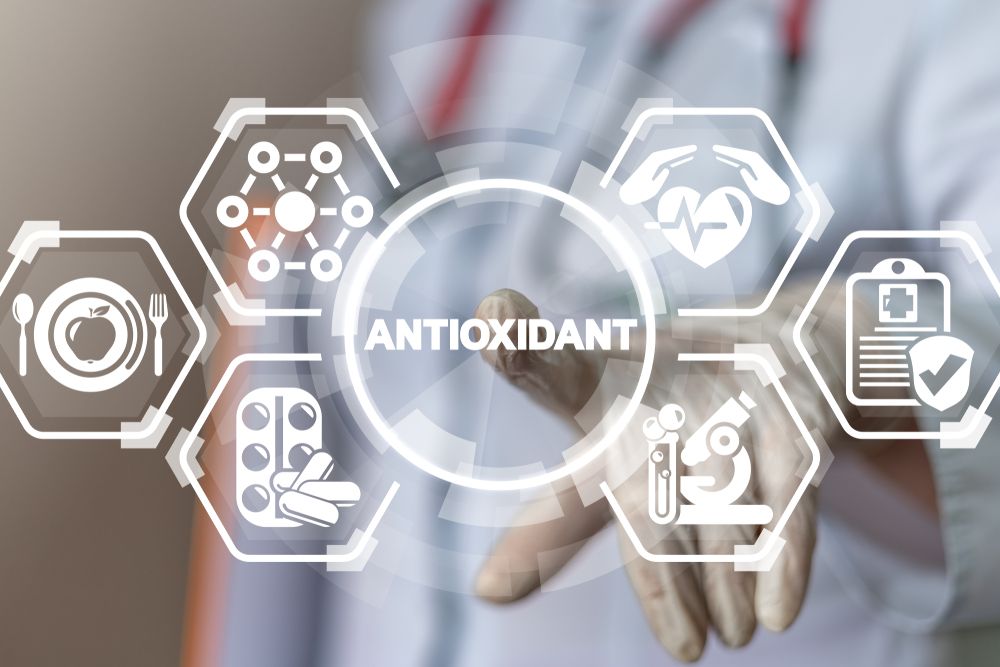


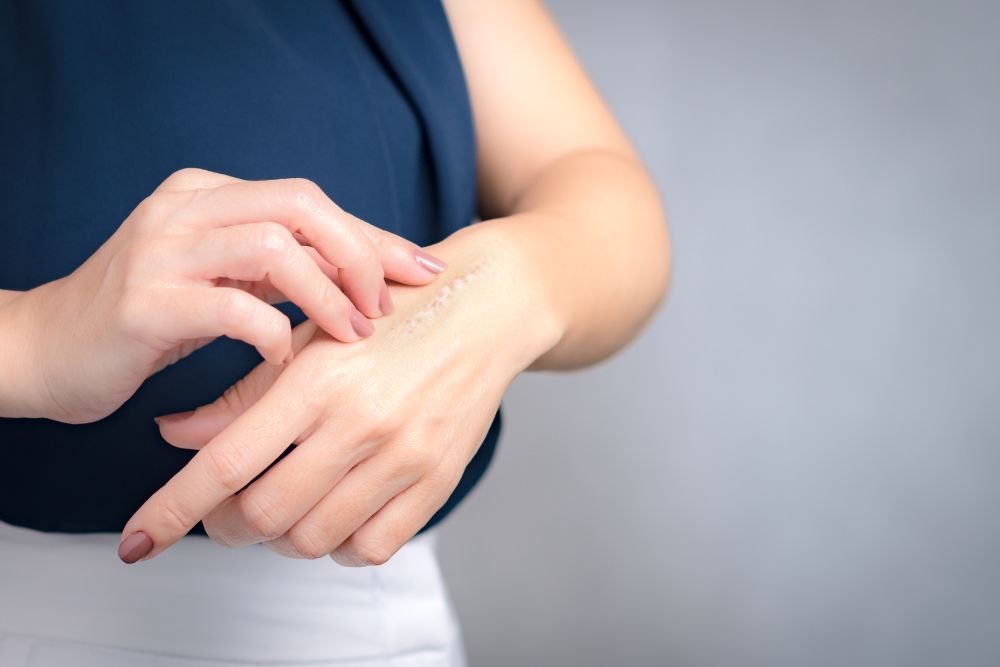


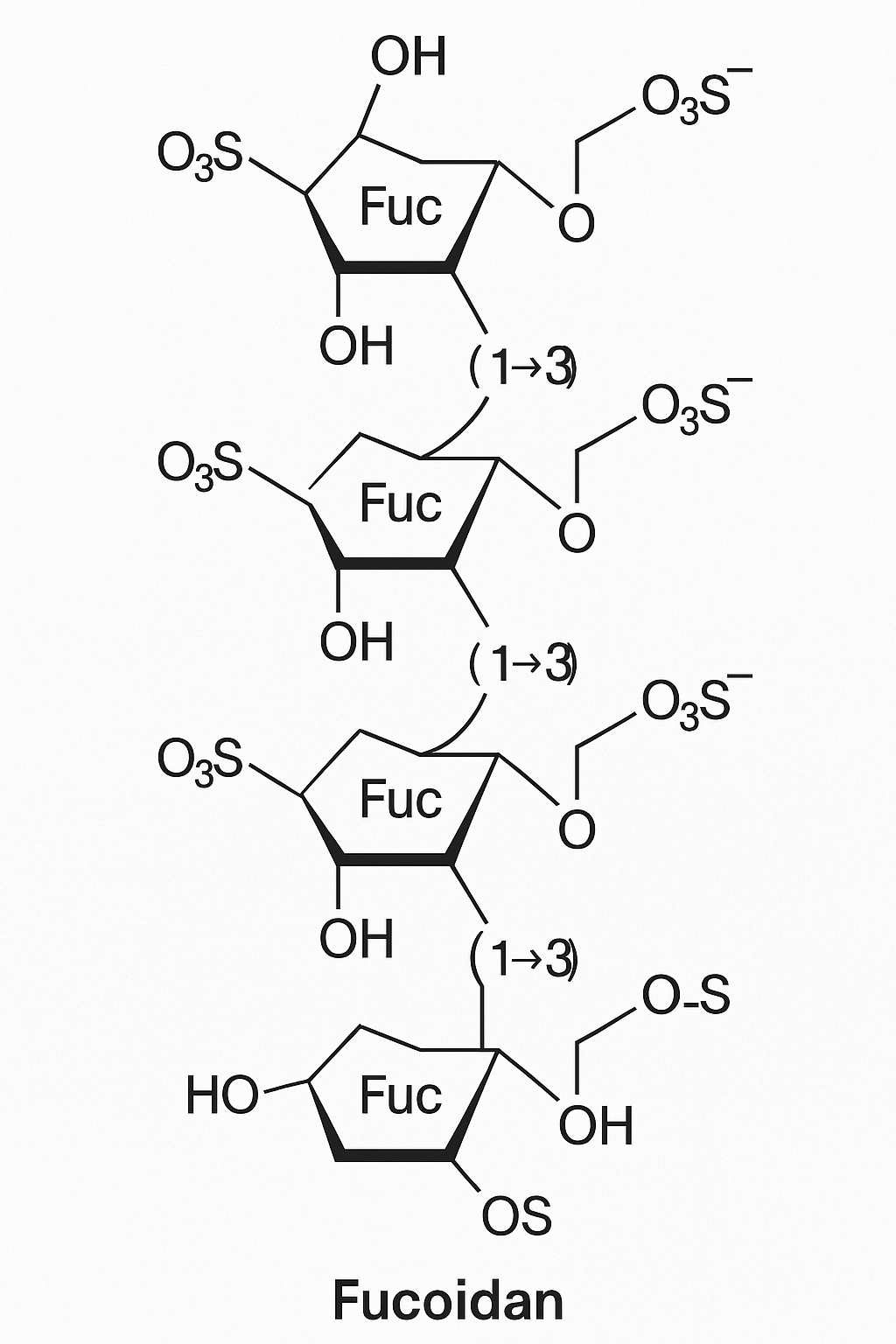
 Undaria pinnatifida, commonly known as wakame, is a type of brown seaweed that typically grows in coastal waters up to 20 meters deep. It thrives in sheltered reef areas where factors like temperature, nutrients, light, and depth are crucial for its growth. Undaria can grow up to 2 meters in length within a year, making it a rapidly renewable resource.
Undaria pinnatifida, commonly known as wakame, is a type of brown seaweed that typically grows in coastal waters up to 20 meters deep. It thrives in sheltered reef areas where factors like temperature, nutrients, light, and depth are crucial for its growth. Undaria can grow up to 2 meters in length within a year, making it a rapidly renewable resource. Laminaria seaweed, also known as kelp, is a large brown algae that grows in cold ocean waters and forms dense underwater forests. It has a holdfast to anchor it, a stem-like stipe, and long fronds that help it thrive. Laminaria is very nutritious, containing iodine, potassium, calcium, and various vitamins.
Laminaria seaweed, also known as kelp, is a large brown algae that grows in cold ocean waters and forms dense underwater forests. It has a holdfast to anchor it, a stem-like stipe, and long fronds that help it thrive. Laminaria is very nutritious, containing iodine, potassium, calcium, and various vitamins.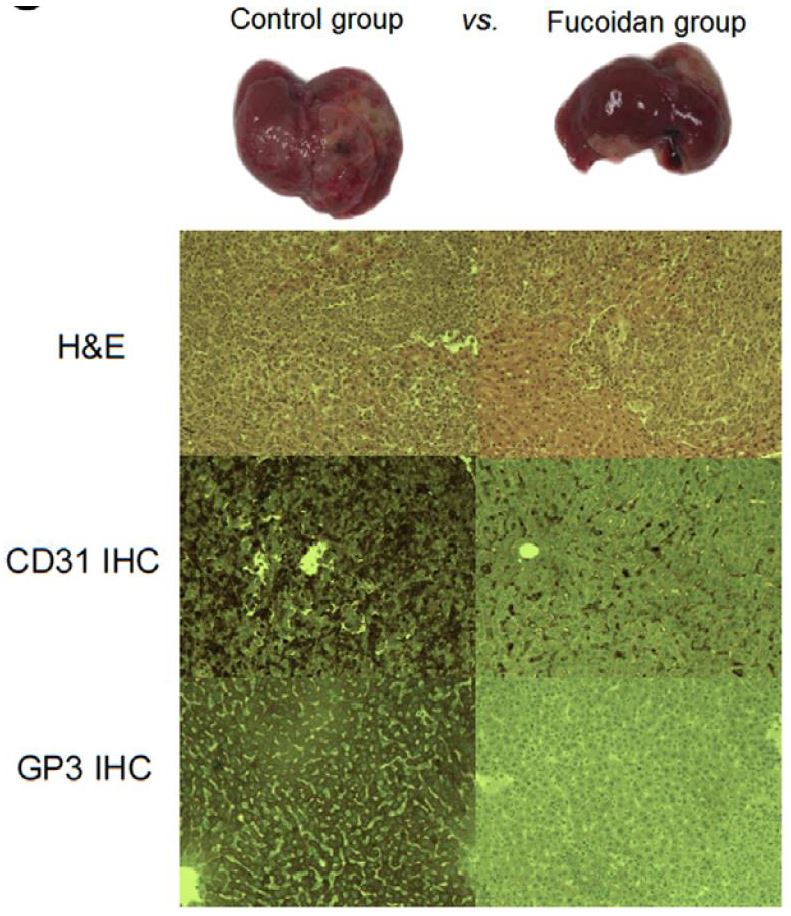
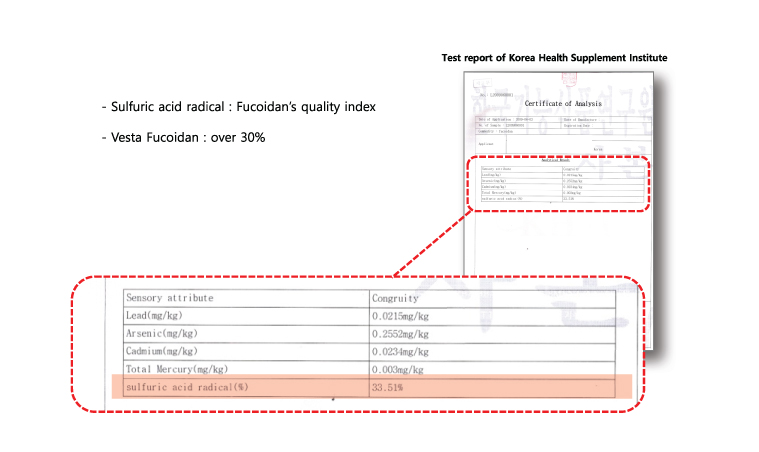
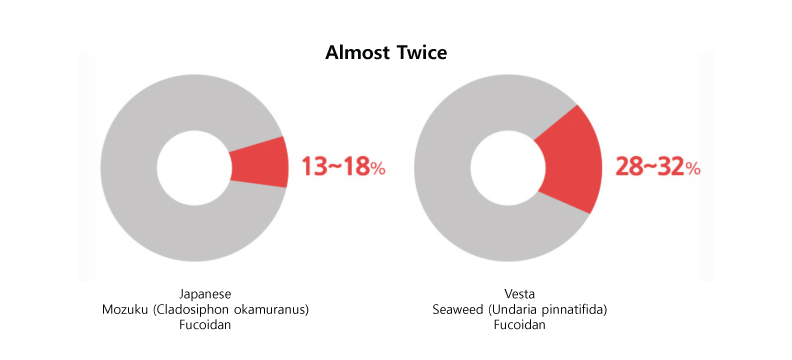
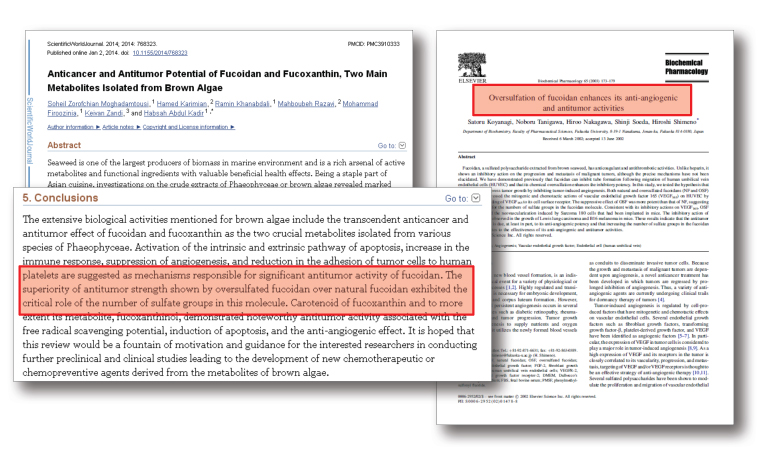
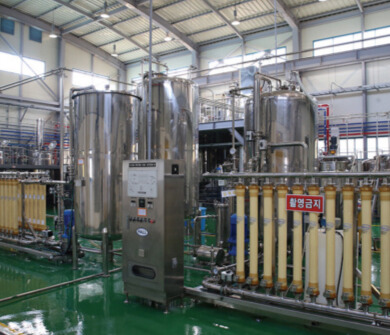
 The proprietary manufacturing method of Vesta UltraFucoidan™ utilizes an Alcohol-Free method and results in a very pure and highly stable product. The UltraFucoidan™ product is all natural and is produced without solvents and is extracted with clean water.
The proprietary manufacturing method of Vesta UltraFucoidan™ utilizes an Alcohol-Free method and results in a very pure and highly stable product. The UltraFucoidan™ product is all natural and is produced without solvents and is extracted with clean water.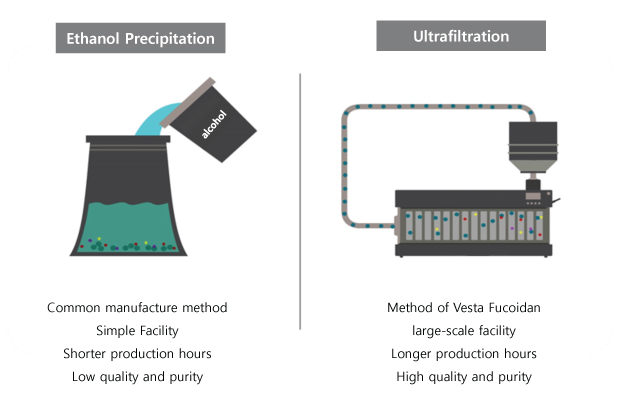
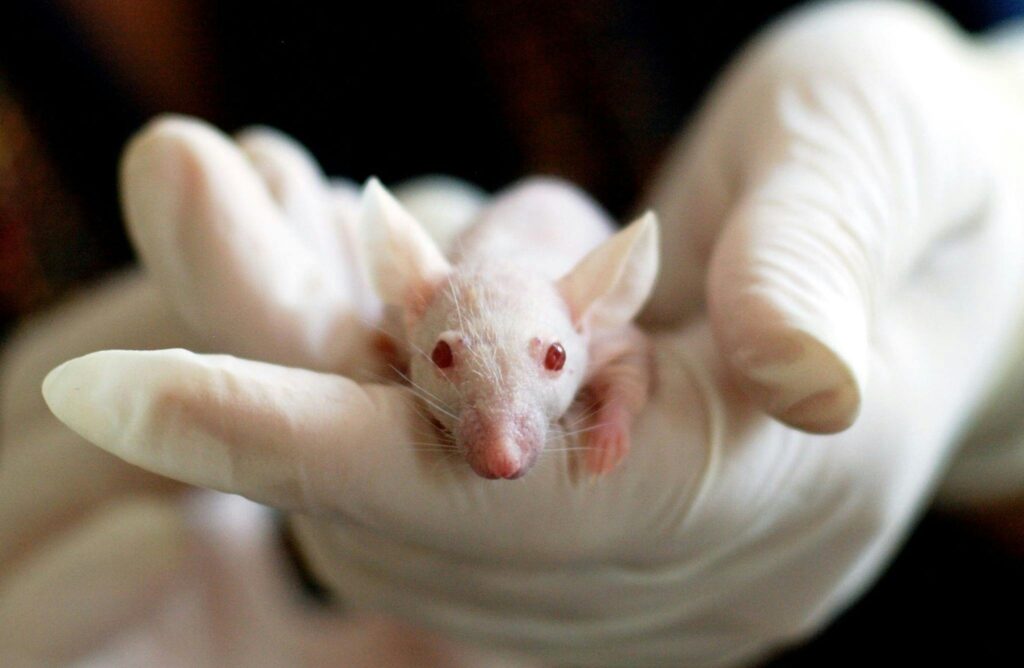
 In addition, the source for Vesta UltraFucoidan™ is from an ocean in Korea which is known to be isolated from Japanese nuclear contamination and hazards.
In addition, the source for Vesta UltraFucoidan™ is from an ocean in Korea which is known to be isolated from Japanese nuclear contamination and hazards.